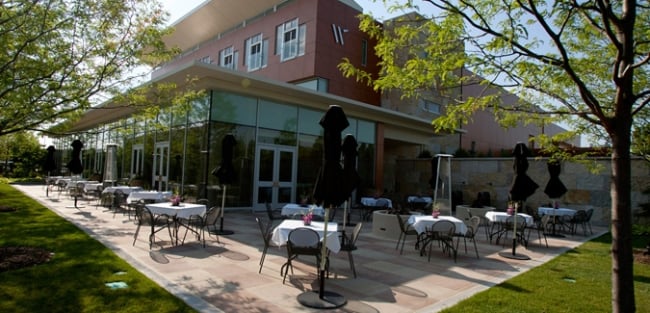You have /5 articles left.
Sign up for a free account or log in.

College of DuPage's Waterleaf restaurant
College of DuPage
Investigations, board conflicts and an embattled president are all familiar territory for College of DuPage.
The second-largest public college in Illinois has a history of high-profile problems with corruption and financial mismanagement. Today, the college, which is about 25 miles west of Chicago, is under fire for shortcomings in its financial oversight, including the way it awarded contracts to donors and paid a $763,000 severance package to President Robert Breuder as part of his early retirement.
These most recent problems have led to a flurry of activity to clean up the campus. Federal prosecutors have subpoenaed the college for financial documents, and state investigations are pending. Illinois lawmakers recently voted to have the state's auditor comb through the college's finances. DuPage's accreditor will conduct its own investigation. Meanwhile, since January, the state's Legislature has proposed more than 30 bills that seek to punish or fix DuPage.
"College of DuPage at one time was one of the flagship community colleges in the nation, with an enormously good reputation, outstanding leaders and board for many years," said Terry O'Banion, president emeritus of the League for Innovation in the Community College.
- More than 28,000 students
- 90 certificate programs and technical degrees, 9 Associate's degrees in 59 occupational and 45 transfer pre-bachelor's programs
- Based in Glen Ellyn, Ill.
- Acting interim president is Joseph Collins
- Last year received $108 million in property taxes and $57 million in state funding
Yet impropriety and controversy have occurred at the college as far back as the late 1970s. Back then, under former President Rodney Berg, news reports revealed DuPage executives spent thousands of dollars on regular lunches and conferences. Those reports are similar to current-day accusations that Breuder and other administrators spent thousands at the campus restaurant Waterleaf. Both drew complaints of wasteful spending of taxpayer dollars, often by college leaders on themselves.
Eventually the college's Board of Trustees would fire Berg -- DuPage's first president -- and face state investigations. Breuder has been placed on administrative leave.
Berg would go on to be replaced by Harold McAninch, who served from 1979 to 1994. Following his retirement he was replaced by Michael Murphy and Sunil Chand. Both Murphy and Chand were ousted with little explanation before Breuder started in 2009. Meanwhile, in 2008, the board chair sued three former board members for defamation.
Last week, the community college, which sits on 273 suburban acres, received notice that its regional accreditor -- the Higher Learning Commission -- would jump into the fray.
The commission will do an "advisory visit" to DuPage in late June. The federal and state investigations prompted the visit, John Hausaman, a public information officer for the commission, said in an email.
DuPage was looking to have its accreditation status reaffirmed, but the commission is placing that on hold, Hausaman said. The college was last reaffirmed in 2008.
Despite the past issues, the commission has never formally sanctioned the college.
The DuPage trustees' approval of Breuder's $763,000 golden parachute caught people by surprise. The board's action followed the full-time faculty union's vote of no confidence in Breuder in September.
"This is the largest buyout package in the state of Illinois. That got everybody's attention," said Jeanne Ives, a Republican member of the state's House of Representatives. "The problem with College of DuPage is that you had a very pliant board that didn't want to push back against a very aggressive president. They forgot the president works for the board and not the other way around."
Fixes from the Capitol
There are about 30 different pieces of legislation sitting in the Illinois General Assembly that relate to the DuPage fallout. Ives, who has at times led the charge against Breuder, has advocated for some of that legislation. She introduced the bill that would force the state's auditor general to investigate the college. That legislation was approved unanimously last week by the state's House and didn't require approval from the state Senate or governor.
Other legislators are pushing for DuPage's board to report all of its administrative expenses to the General Assembly and to receive mandatory professional development. Some have suggested capping severance packages or cutting state funding because of Breuder's payout.
"If there is legislation that would impact in any way the board's ability to locally govern their community college district, we would resist that legislation," said Mike Monaghan, executive director of the Illinois Community College Trustees Association.
Some of the proposed legislation also could have ramifications for the other 47 community colleges in the state.
"We've been tracking those bills and trying to ensure that the colleges maintain the level of local control that that they are given in statute," said Karen Hunter Anderson, executive director of the Illinois Community College Board, which oversees the state's two-year colleges.
The board has come under fire for some of DuPage's problems. O'Banion cited that criticism, and discussed his writing about the damage college trustees can cause when they "go rogue."
"Rogue trustees serve their own interest to a detrimental end," he said. "And from what I hear, I think that's a major issue there."
There is no board, association or entity that oversees the trustees. Like almost all elected college board members, they answer to the people in the district who elected them. The board hires the president and has local taxing authority within the district.
"We had one outstanding trustee who started seeing problems with how they handled finances, and when she started to raise the red flag, she got pushback," Ives said.
That trustee is now the board's chair, Kathy Hamilton. Last August, the then board voted to censure Hamilton for "inappropriate conduct" and "misstatements" about a $20 million project she opposed.
Despite the problems, Ives praises Hamilton and a number of whistle-blowers for bringing issues to light at DuPage.
"You've got senior administrators who allowed this to go on time and time again," Ives said, adding that without those whistle-blowers, much of the alleged activity could have continued for a few more years.
Monaghan said DuPage is certainly not a normal situation, but he is encouraged by efforts to improve its governance. "We have a newly elected board moving into College of DuPage, and the new board has chosen to make some changes and to look into the issues that have allegedly been occurring at the college."
Ives said despite the upcoming investigations, she's optimistic about DuPage's future because it's under new leadership.
"This community is still behind College of DuPage," she said. "The new trustees are hiring the right people and asking to get past this. We still have a long road to go and people who need to be held accountable for what they did in the past."
But Ives said the troubles haven't repelled students like her son, who is planning to take a class on the campus before going to the University of Illinois.
"People are still going and they're still attending, which is a good thing," Ives said.








